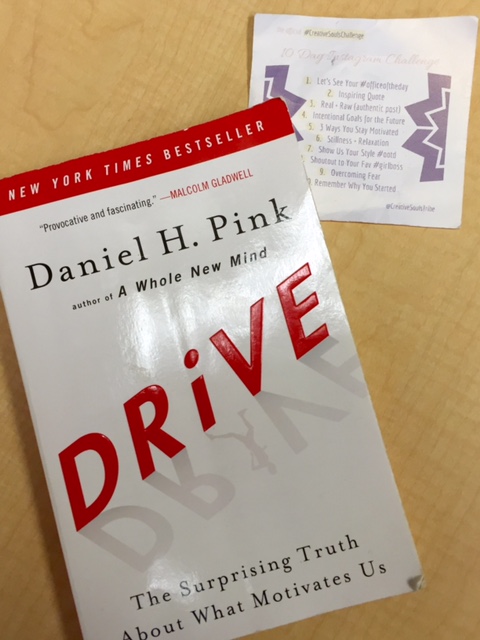The #CreativeSoulsChallenge, Day 5 is to blog about 3 ways that I stay motivated and I love chatting about motivation so this one’s a treat. I’ve been able to do two presentations on motivation this year at the College Panhellenic Conference and Vanderbilt’s The Leadership Studio.
I’m a fan of Daniel H. Pink’s book, Drive: The Surprising Truth About What Motivates Us. As luck would have it, he provides 3 ways to motivate yourself and others that are a departure from our classic extrinsic motivators of money, food, and stuff. When you want people to do higher level work and be creative, you’re going to have cater to their intrinsic motivators–things that come from a personal and internal space.
A.M.P
Autonomy–Am I able to self direct my time, task, technique, and team?
Mastery– Am I getting better at something?
Purpose– Am I doing something meaningful and relevant for my life or the lives of others?
When I read this book, I could clearly reflect on moments when I’ve had a lapse in motivation, and how it was connected to one of these factors.

A= Pink states that one of the “t’s” might be more important for you than the others. Perhaps you don’t care if someone tells you how to do something (technique) but you want to be able to choose when you do it (time). For me, time and team, are important to maintaining a high level of motivation.
Time= I don’t like anyone to be in charge of my time. Only my boss (sparingly) and my boss’ boss (sparingly) are able to put meetings on my calendar. If I feel like I don’t have control over my time, I’m not happy and I will not be motivated to get the work done.
Team= I really like to choose my team. Inherited teams are hard for me.
Do you have autonomy over the areas that matter to you? How are you providing autonomy in these areas to those you supervise? Or are you micromanaging the motivation right out of the room?
M= I’m an achiever. I have to know that I’m getting better at the work I’m doing in my full-time job as well as my side hustles and community work. Improvement is highly motivating for me when I speak or host educational programs. Have I gotten better? Have we improved as a team? On top of that, for me to be truly motivated, I have to want to get better at the skills utilized for a project.
In general, people want to develop and grow as a person and a professional. How is this work helping them to move toward mastery? How are you helping people track their growth? Are you celebrating their improvement? Recognition is good.
P= The WHY is critically important for my motivation. What is the purpose of the project? Why does this task matter? How is it contributing to the bigger picture? “Because I said so” doesn’t work with me at the age of 33. I have to know if I’m making a difference. Knowing the Purpose really helps motivate me when I’m engaged in tasks that I don’t enjoy. I hate the financial pieces of my current job BUT I have to do those things so that we can continue offering great programs. Now, if I don’t find a WHY or if the WHY I find is ridiculous then I’ve totally discovered the root of my motivational hardship. If it doesn’t matter then stop doing it. No one has time or desire to do meaningless work.
People have to know that what they are doing matters. Why are we raising this money? Why are we painting this wall? Why are we stuffing these envelopes? Take them back to the WHY when motivation declines.
Those are my three ways that I stay motivated. I think through these elements before I begin a project and when I can sense myself hitting a wall, I tap back into this knowledge and do a quick assessment of what I’m missing. Perhaps I need to take more control over a certain area, remember how what I’m doing is helping me become better at a desired skillset, and remind myself that what I’m doing matters.
Do an A.M.P. assessment the next time you experience motivation issues.
Want to watch an animated version of the book? Go.
Daniel H. Pink’s TED Talk? Go.
Thanks for reading!
Krystal
